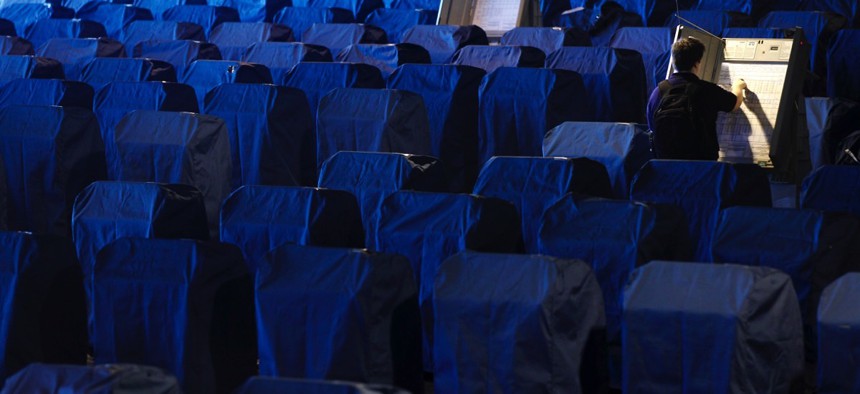Hackers Press Secretaries of State to Support Independent Testing of Voting Machines

Voting machines being tested in May 2011 in Philadelphia. Matt Rourke / AP Photo

Connecting state and local government leaders
The Senate Intelligence Committee also touted the Voting Village’s efforts to probe election equipment while chastising its naysayers.
Two weeks after hackers publicly disagreed with the nation's top election officials about the utility of exercises to break into voting machines at a major hacking conference, the Voting Village is reaching out to secretaries of state to ask them to sign onto a statement in support of independent, third-party testing of voting equipment.
The campaign became public after the National Association of Secretaries of State accidentally emailed reporters about it on Wednesday while intending to reach out to members’ communications directors.
“It gives us more attention, that we’re actually not trying to garner, and seems to be the opposite of what their members want,” Jake Braun, cofounder of the Voting Village, told Route Fifty. “What we want more than anything else is to have a working relationship with the election officials in the country.”
NASS was dismissive of the Voting Village’s methodology for hacking voting machines at DEF CON in Las Vegas earlier this month. The group called the effort “unrealistic” in a statement.
The email the Voting Village sent to secretaries of state is one of multiple communications it’s put out. Braun’s team compiled the contact information for local and state election officials across the country and sent them an invite ahead of the conference, as well as two follow-up messages and made 3,500 phone calls, he said.
More than 100 election officials from the federal down to the local level turned out this year and sat on panels, compared to only a handful last year. Those who participated in 2017 mostly didn’t announce it publicly, Braun said.
In its most recent email, Voting Village gave secretaries of state until Aug. 31 to add themselves to the list of election officials backing independent testing of voting machines, after which the group will release a report of its DEF CON takeaways.
NASS hasn’t taken a position on third-party testing of voting machines, but its Elections Committee will be discussing the issue in the coming months and at its 2019 winter conference in Washington, D.C., an organization spokesperson said.
Vermont Secretary of State Jim Condos, NASS’s president, received the Voting Village’s latest email but couldn’t comment on its forthcoming report of technical discoveries at DEF CON without first reading the findings, said his spokesperson.
All of the voting machines on display at DEF CON are used in the majority of U.S. states, Braun said.
“We spend two-and-a-half days a year doing research on these machines,” he said. “The Russians are spending all day, every day, 365 days a year researching their vulnerabilities.”
On Wednesday, members of the U.S. Senate Intelligence Committee sent a letter to Election Systems & Software, the third largest such vendor in the U.S., expressing concern the provider was unprepared for a foreign cyberattack and citing the Voting Village’s success probing election equipment.
“We are disheartened that ES&S chose to dismiss these demonstrations as unrealistic and that your company is not supportive of independent testing,” reads the letter. “We believe that independent testing is one of the most effective ways to understand and address potential cybersecurity risks.”
ES&S responded that assertions its products are not independently tested are “erroneous” and that testing is performed by both the U.S. government and “third-party experts,” in a statement.
The U.S. Election Assistance Commission’s Testing & Certification team is states’ first line of defense in ensuring the security of voting systems through its System Certification Process and Quality Monitoring Program.
EAC has disbursed most of the $380 million in Help America Vote Act election security funds to states a little more than two months before the midterms. A few are spending the money on independent assessments, Braun said.
“There are definitely states and locals doing this now,” he said.
Dave Nyczepir is a News Editor at Government Executive’s Route Fifty and is based in Washington, D.C.

NEXT STORY: Coast Guard looks into sensors for maritime surveillance





